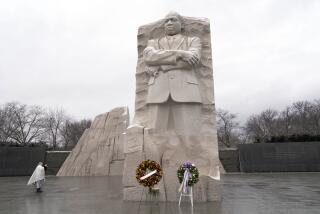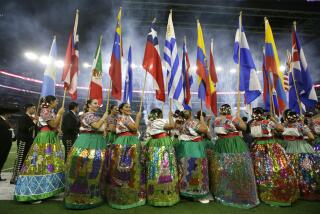Picking a Month to Appreciate Jazz
WASHINGTON — In an effort to increase public awareness of one of America’s original art forms, the Smithsonian Institution and the National Endowment for the Arts heralded Friday the designation of Jazz Appreciation Month, a nationwide observance that could include free jazz concerts, lectures and community events.
A panel of jazz enthusiasts and supporters, including musician and composer Quincy Jones, was on hand at a news conference to praise the genre’s impact on society.
The celebration will start in April 2002, so that schools, colleges and libraries can accommodate their schedules to factor in jazz appreciation programs. April was also picked because it is the birthday of many legends, such as Duke Ellington, Ella Fitzgerald and Billie Holiday.
“Each April we would like to see America and other nations bebop, swing, rift, jab and finger-pop to the synchronated strings of jazz,” said John Edward Hasse, curator of American music at the National Museum of American History.
The Smithsonian decided to initiate the celebration because many Americans lack knowledge of jazz’s history and influence, a fact many curators believe helped shape current popular culture.
“Jazz is the greatest of all of America’s music,” Hasse said. “It’s the one that achieved the highest level of artistic accomplishment, virtuosity, expression, creativity, and it encapsulates so much of the history of this country in the 20th century.”
Rep. John Conyers Jr. (D-Mich.) said he was concerned that jazz music had more recognition abroad than in the United States. With many jazz greats nearing the end of their careers and youngsters tempted by other forms of music, such as hip-hop and rap, Conyers and others advocated the need for more emphasis on jazz as the root of most current popular music.
Jones, who played backup for musicians such as Count Basie and Lionel Hampton, said he hopes the annual celebration will encourage young people to get excited by the music.
“One of our biggest challenges is we need to teach Americans about American music,” Jones said.
“It’s our classical music and, 50 years from today, jazz musicians will be considered the Bachs, Beethovens and Mozarts of our country.”
More to Read
The biggest entertainment stories
Get our big stories about Hollywood, film, television, music, arts, culture and more right in your inbox as soon as they publish.
You may occasionally receive promotional content from the Los Angeles Times.










